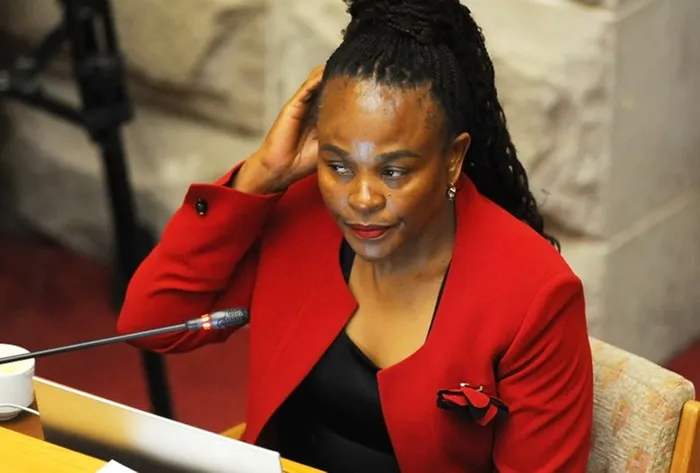No R10m gratuity for former public protector Mkhwebane

Former public protector Busisiwe Mkhwebane. File
It would be absurd for an employer to be expected to pay a gratuity—being a token of appreciation—to an employee who left office in disgrace, the Gauteng High Court, Pretoria said in turning down former public protector Busisiwe Mkhwebane’s application for an order that she is entitled to R10-million gratuity payment.
Judge Omphemetse Mooki also slapped Mkhwebane with the costs of the legal proceedings before court against her former employer and the current public protector, Kholeka Gcaleka. Both Gcaleka and Mkhwebane asked the court to issue a punitive costs order against the other, which the judge declined to do.
Mkhwebane wanted Gcaleka to foot a punitive costs order from her private purse, as she claimed the decision to deny her gratuity followed Gcaleka’s “biased, malice and vindictiveness” towards her.
The office of the public protector, on the other hand, sought a punitive costs order, arguing that Mkhwebane made unwarranted personal attacks against Gcaleka and her office, making reckless allegations on oath without having regard to the truth.
While Judge Mooki declined both requests, he had some sharp words for Mkhwebane: “There is much that is regrettable in what the applicant said about the respondents. She did not substantiate the very serious allegations she had made, both in relation to the office of the public protector and the person of Ms Gcaleka as the public protector.”
The judge noted that there was no need for Mkhwebane’s “intemperate” comments against the National Assembly regarding the events that led to her removal from office. Mkhwebane turned to the court to compel the Office of the Public Protector to pay the R10 million gratuity she claims she is entitled to.
Although she was removed from office last year—a month before her term lapsed—for misconduct and incompetence, she maintained that it made no difference, as she had vacated office and was thus entitled to a gratuity payment.
She pointed out that she was the only public protector who, after vacating office, did not receive a gratuity payment. According to Mkhwebane, several of her constitutional rights were infringed by refusing her this payment.
This argument was countered by the office of the public protector, which maintained that there is a significant difference between vacating an office and removal, as the latter is done in cases where a person is disgraced.
The main contention between the parties was the interpretation of her contract of employment regarding the term “on vacation of office”—the latter which allowed for the payment of gratuity.
While Mkhwebane argued that a number of provisions of the Constitution were breached in not granting her this payment, Judge Mooki commented that she did not elaborate on which provisions were exactly breached. He stated that the court cannot simply declare these provisions were breached if it does not know which provisions.
He also shot down her argument that the Basic Conditions of Employment Act (BCEA)—as part of her remuneration—included a gratuity payment. The judge ruled that this argument must fall, as gratuity did not form part of the BCEA.
Turning to Mkhwebane’s argument that “vacation of office” simply means that a person leaves office—no matter how—Judge Mooki stated that expressions such as “vacating office” cannot mean whatever a person has in mind. He asserted that “vacation from office” and “removal from office” are definitely not the same thing.
He agreed with the office of the public protector that gratuity is a token of appreciation expressed by an employer towards an employee. He concluded that it would be absurd for an employer to show this gratitude to an employee who left office in disgrace.
In turning down her application, the judge stated that gratuity payment, in terms of Mkhwebane’s conditions of employment, was payable at the completion of her term when she vacated office, and not upon being removed from office as was the case.
In responding to yet another legal defeat against her, Mkhwebane said the decision to dismiss her application reflects a persistent pattern of legal proceedings that have seemingly been weaponised to financially burden and corner her, as the former public protector.
“Such relentless pursuit of costs paints a picture of choreographed persecution, where legal costs and proceedings are used systematically to drain resources and morale,” she said, adding that these actions resonate eerily with Steve Biko’s sentiments about pushing the boundaries within an unsympathetic system to expose its flaws and limitations.
Mkhwebane commented that it raises questions about the integrity and impartiality of the legal processes when they appear entangled with political machinations.
She said it must be questioned whether the courts are merely upholding the law or if they are being manipulated to serve as instruments of persecution against those who stand their ground against systemic pressures.
Pretoria News
zelda.venter@inl.co.za